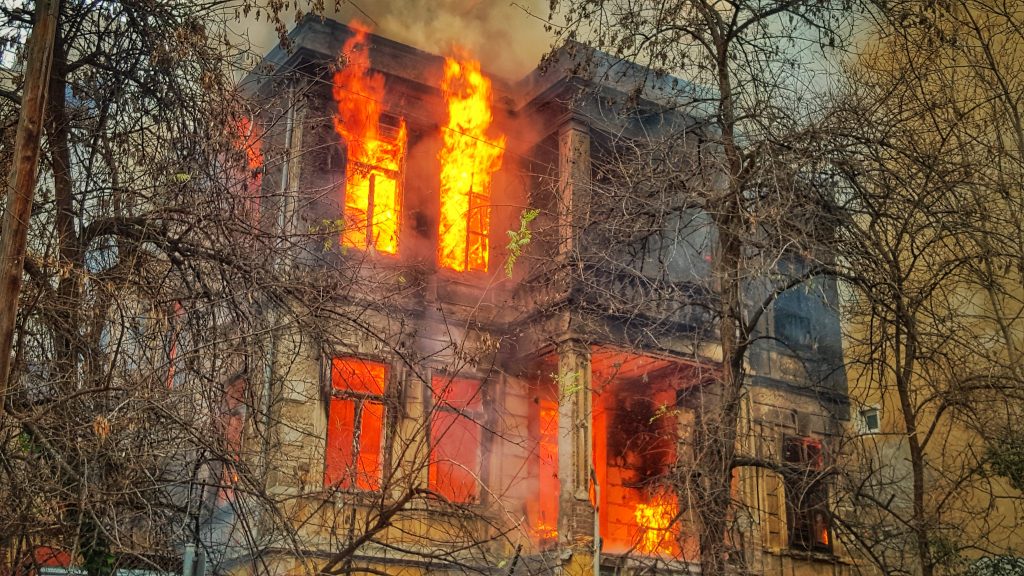
What are common causes of home fires?
According to the National Fire Protection Association (NFPA), the top 5 causes of fire are:
- Cooking was the leading cause of reported home fires and home fire injuries in 2015-2019 and the second leading cause of home fire deaths. Thanksgiving is usually the peak for home cooking fires, followed by Christmas.
- Unattended cooking
- Frying
- Stoves
- Ovens
- Grilling
- Heating is the second leading cause of home fires and home fire injuries and the third leading cause of home fire deaths. Logically, most home fires caused by heating are from December through February.
- Fireplaces
- Space heaters
- Furnaces
- Water heaters
- Electrical systems make our lives easier, but improper installation and poor maintenance can present hazards and cause home fires.
- Poor mechanical maintenance
- Wiring, lighting, cords and plugs
- Smoking materials, including cigarettes, pipes and cigars start thousands of home fires and are responsible for hundreds of deaths each year.
- Smoking near flammable items
- Failure to properly extinguish smoking materials
- Candles cause thousands of home fires and are responsible for almost 100 deaths each year.
- Candles placed near flammable items
- Candles placed on unstable surfaces
- Candles placed in the reach of children
How can I prevent common home fires?
Keep an eye on what you fry! Unattended cooking is responsible for most home cooking fires. Most home cooking fires occur while frying. Remove all flammable items from the cooking area, such as towels, oven mitts and long sleeves on shirts. Keep children away from the cooking area.
An ounce of prevention is worth more than a pound of cure. Routine upkeep of water heaters, fireplaces, space heaters, stoves and electrical systems can prevent unnecessary fire damage.
Flickering lights can be a sign of loose wiring. When wires are not connected properly, electrical currents traveling through the loose gap could create sparks, which may lead to an electrical fire. Call a professional to fix this problem right away.
Smoking can be dangerous to your health… and your home. Smoke outside away from flammable items. Extinguish all smoking materials properly so they don’t reignite and start a fire.
Another frequent cause of home fires is simply carelessness. Be aware of your surroundings and how they would react to heat, friction, static electricity, sparks or open flames. Don’t leave hot items or open flames such as hot plates, stovetops or candles unattended.
Flammable liquids such as alcohol, gas, aerosol and lighter fluid should be removed from your home and handled as little as possible. If a flammable item must be kept in your home, keep it out of the reach of children and pets.
Smoke detectors are necessary to alert residents of home fires. Immediate awareness of smoke in your home is crucial for taking action before it’s too late. In many cases, occupants only have 2 minutes to escape a burning home before it’s too late. To make sure your smoke detector is in working order, hold down its button until the alarm sounds. If needed, use a long object like a broom, or stand on something secure like a foot stool to reach the text button. If you don’t hear the alarm after several seconds, you should change the batteries or call an electrician. A non-functioning smoke detector more than doubles the chances for serious injury during a fire. Most smoke alarms are good for ten years. If you’re not sure how old yours is, check the date of manufacture on the back.
How do I use a fire extinguisher?
If a small fire starts, use a fire extinguisher to put it out fast. If you need to use a fire extinguisher, remember the acronym, “P A S S”, which stands for: Pull, Aim, Squeeze and Sweep.
- P: Pull the pin and break the seal.
- A: Aim the hose at the base of the fire.
- S: Squeeze the handle to release the contents.
- S: Sweep back and forth to cover the entire fire area.
What should I do in case of a fire emergency?
If there is an emergency, don’t try to fight the fire. Find the nearest exit and crawl there. The safest air is 12-24 inches off the ground. If your clothes catch fire, stop, drop and roll to put out the flames. Use your hands to cover your face and protect your lungs. Call 911 as soon as you get to safety. In many cases, you only have about 2 minutes to get out of a burning home before it’s too late.
An ounce of prevention is worth a pound of cure. However, if you have a disaster, a homeowners or renters insurance policy can help protect you from financial ruin.
How can I buy homeowners or renters insurance in Oklahoma?
There are two easy ways to get a quote or request more information for homeowners or renters insurance in Oklahoma:
- Call/Text (405) 605-9891
- Email jp@schererinsurance.com